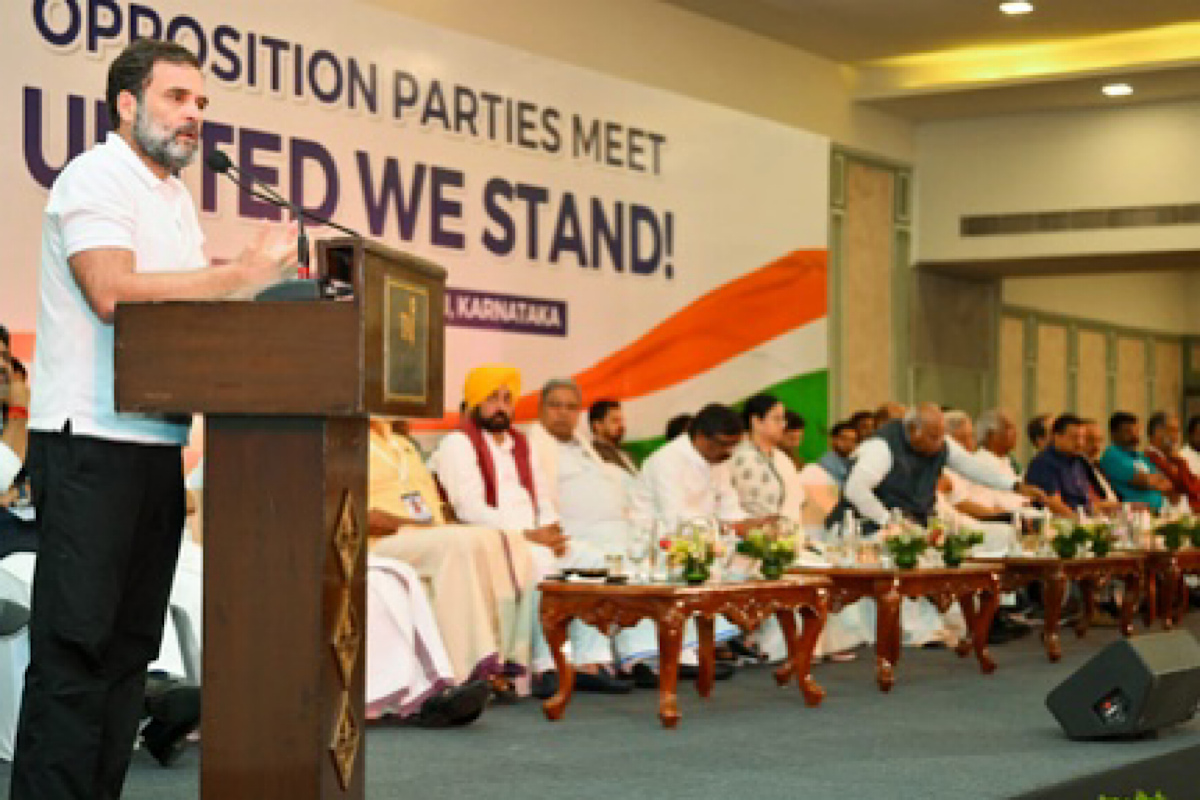TMC chief Mamata meets Sunita Kejriwal at CM’s residence in Delhi
The meeting was held at the official residence of the Delhi chief minister in the presence of party's Rajya Sabha MP Raghav Chadha.

Opposition alliance INDIA. (photo: IANS)
Some opposition chief ministers, including Nitish Kumar, Mamata Banerjee, M.K. Stalin, and Arvind Kejriwal, speculate that the 2024 Lok Sabha polls may be held earlier than expected. It could be combined with the upcoming Assembly elections in Madhya Pradesh, Chhattisgarh, Rajasthan, Mizoram and Telangana. Other political leaders have voiced similar opinions. Furthermore, the ruling BJP has expressed interest in conducting simultaneous elections across India. The BJP faces a challenge if Opposition unity remains intact.
However, the Prime Minister’s popularity, the party’s financial resources, and strong organizational strength may still give the BJP an advantage. After Patna and Bengaluru, the newly formed I.N.D.I.A. coalition got together for the third round of brainstorming session in Mumbai. As many as 63 representatives from 28 political parties attended the two-day meeting of the Indian National Developmental Inclusive Alliance (I.N.D.I.A.) on Thursday and Friday.
The main topic was to chalk out their common campaign strategy and how to counter the N.D.A. At the meeting, the Opposition discussed cooperation in areas where the BJP is ruling or where they are the main Opposition. Their goal is to present a joint candidate for the 2024 Lok Sabha elections. Despite the egoistic, strong regional satraps holding sway in their fiefdoms, they must achieve this. Congress party leader Rahul Gandhi recognized the inherent contradictions but assured they would work to resolve them. For example, Congress and AAP are political rivals in Delhi and Punjab, while in West Bengal, Trinamool Congress, the Left parties, and Congress have interests. The Left and Congress also have stakes in Kerala.
Advertisement
The I.N.D.I.A. coalition aims to field a single opposition candidate in constituencies where the BJP currently holds power or is the leading competitor. Mamata Banerjee suggested releasing the bloc’s manifesto by October 2. Arvind Kejriwal proposed finalizing seat sharing for the Lok Sabha elections by the end of next month.
The I.N.D.I.A. team faces the difficult task of overcoming inherent contradictions among coalition partners. They must agree on a give-andtake policy for seamless seat allocation and collaborate at the grassroots level. According to insiders, the Opposition challenges include: Finding appropriate candidates. Resolving competing claims for seats within the alliance. Ensuring that the joint candidate is electable. Ensuring that all alliance partners are committed to the success of the chosen candidate. The upcoming elections are crucial for both the ruling BJP and the Opposition.
The Opposition’s morale has been impacted by BJP’s decadelong rule, with workers unwilling to remain in the wilderness for another five years. Their strategy remains undisclosed. As per insiders, the BJP has prepared for all possible scenarios, with approximately workers covering 100,000 booths across all 543 parliamentary constituencies. The BJP’s challenge is to weaken the Opposition and maintain its financial and organizational strengths. The BJP views Modi as their good luck charm.
The party is ruling in 10 out of 29 states in India. The BJP leads the NDA coalition with its current 38 parties. Together, they have more than 55 per cent of the seats in the Lok Sabha (543 seats.) Modi intends to take advantage of the disorganized Opposition to win a third term in office. During the 2019 election, the BJP gained 37.4 per cent of the vote, a 6 per cent increase from the previous election.
The NDA also saw an increase in voter support, reaching 45 per cent compared to 38 per cent achieved in the last election. The Indian National Congress maintained their vote share at 19.5 per cent. Analysts believe that to compete with the BJP successfully, more needs to be done to achieve unity among opposition forces. Half of the battle will be won if they can distribute seats smoothly. The Assembly elections in Madhya Pradesh, Rajasthan, Chattisgarh, and Mizoram could be a preview of what is to come.
The BJP wants to hide their plans from the Opposition and stop them from getting liberal funds. They also want to split the Opposition and keep neutral parties like BJD, Y.S.R.C.P. Congress, and B.R.S. from taking sides. Modi is far more popular than any opposition leader. The BJP may be cautious about calling for early general elections, given their experience. In 2004, they were predicted to win but were ultimately defeated by the Congress-led UPA in a surprising upset. The BJP has established a strong presence in the Hindi heartland but has yet to make significant gains in the South, where 129 seats are up for grabs.
There is no official word on whether there will be early Lok Sabha elections. The ruling BJP or the Election Commission have yet to make a statement. Ultimately, the decision rests with Prime Minister Modi, known for taking unexpected decisions.
Advertisement